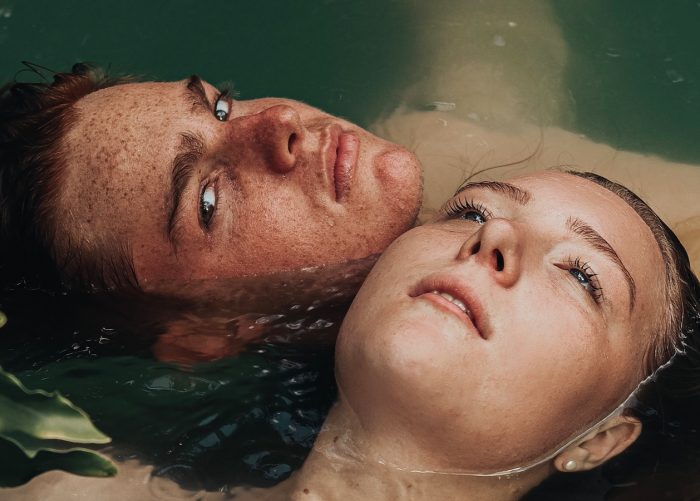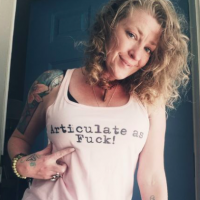I can see him so clearly—there is nothing between us but kisses.
The moon is riding high as I sit on his lap, staring into his eyes. At that moment I decide to take him to bed.
I did this once before in my 20s, on New Year’s Eve. And though that man had wanted to see me again, I was only passing through town and it wasn’t possible.
This time, it is my house and we’ve just eaten my food. This is completely on my terms, and it is incredible. It’s one thing to have sex with a stranger—it’s completely different to make love with an agent of chaos. And that is what we will become to each other.
There is me: sweet, caring, direct, and open—more in love with communication than I will ever be in love with him.
And then there is him: yearning, struggling, stressed, overworked, full of care, full of confusion, and trying to meet me in places where he has never gone (or if he has it has been a long time)—the places where I, on the other hand, live.
I dwell in vulnerability. I breathe it. It is fundamentally who I am, and what I most value—I cultivate it in others for a living. Occasionally, I get knocked off my feet. I can be too tender, too open, too honest, too caring for this jaded world, and that care, though like a balm, effortlessly points out places where people hurt, yearn, and ache for themselves.
At first, it’s me they ache for (and I ache for them too). If the trance is thick, that never changes.
Recently I left a pile of stuff that a former friend had left at my house, over the course of our working on a project together, in a heap under my carport. I sent a text that said, “Come get your sh*t between six and eight. Make sure you bring your truck.” And I drove away. To my great relief, it was gone when I came home.
He had fallen into that trance with me. He wasn’t in love with my potential, though. He was bringing his own warped vision of what we were going to become to each other into the real world. His fantasy repeatedly crossed my boundaries. His fantasy led him to stalk me.
Anytime we fall in love with potential, we see something that isn’t quite there, but not necessarily to that degree. That man made me uncomfortable, but because some part of me thought I needed to give everyone a chance to change and be decent, I shut down my instincts.
To return to my most recent lover, the sweet, confused agent of chaos—we chose each other. He woke up my instincts, my wounds, and my care.
I wanted to know him, as soon as we started texting (we met on a dating app). What can I say about the energy that began to swirl in me as we explored each other flirtatiously? It was amazing! There were bubbles, tingles, and of course, twitches from my anxious attachment style (perhaps that will always be there). We talked and got naked physically and emotionally. It was probably too quickly, but the opening was there. We both proceeded into the warmth that our bodies and shared presence were creating. No regrets.
Perhaps you are thinking, “Ah girl, warning bells, you oughta know better!” Well—f*ck that.
I know my body, and I was not about to pass up the chance to explore intimacy with this lover. We both dove in. But, in my joy and infatuation, I made one slight miscalculation—it wasn’t sustainable. It could have been for me because of the openness in which I live, but not for him. Those places that we so sweetly sank into, together, were still full of pain. His life was consumed by stress.
And this is how it happens. It’s not that it is a fantasy; it’s that we see this person more clearly than they see themselves. It’s that love (or its potential) opens all our wounds, activates our neuroses and fears, and triggers the most human ache that we all share—abandonment.
We see this beautiful other before us, and we long for what they first showed us. More than long for it, we still see it. It’s not a glamour—it’s real. But when they look into the mirror of their own longing and discontent, they see something else.
They see someone less worthy of our love than we believe them, no, know them to be. They see all the ways they are failing in life, the ways they are not good enough. They see the glaring disparity between how they are capable of operating in the world, and who and what their family and culture have told them they are supposed to be. Their vision of themselves twists them up, mentally, emotionally, and physically, even. They cannot see the love we are offering, and if they can, they do not know how to unravel their own pain and confusion enough to receive it.
They may keep themselves in this trance with all kinds of methods. Often it’s addictions cementing the blocks that shame has built around the most tender of hearts, layers to insulate the hurt. Perfectionism is another way self-loathing manifests. When nothing is good enough, we never have to feel the weight of our disappointments, but we never fully feel joy, either. I know this one. These trances are rooted in emotional numbing, which is why we can see that potential, but they can’t. When people are not available to themselves, they will never—as long as they cling to the trance of unworthiness—be available to us.
So what do we do? I know what I do, or have done, and am undoing—over function and shutdown. I shut down my instincts, and my own feelings, to make sure that I can match the reality that my beautiful other is projecting. “It’s better than being abandoned,” some part of me offers, and I shrug in agreement. But it’s not, because then I abandon myself. Then we are in that wound together, and neither of us is accessing the necessary resources to pull ourselves, let alone our beautiful other, out of it. We, honestly, cannot pull another out. They have to want to do it themselves.
That means the stories of victimhood have to be given the proper context. Healthy boundaries must be negotiated. Accountability must be claimed, where it can be, and placed where it needs to reside. That means we have to stop trying to fix them—stop trying to find solutions for their inner world and earthly woes.
We don’t cease to care, but we make our care for our own goodness the model through which we live. We stand in that warmth and welcome those who can to join us.









Read 18 comments and reply